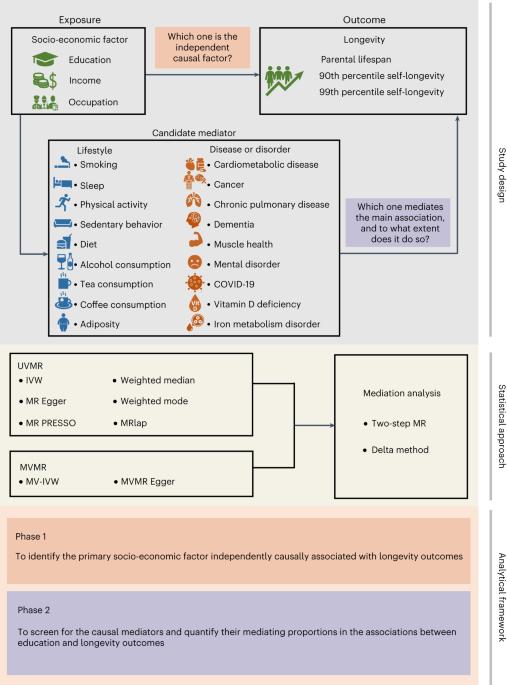Mendelian randomization evidence for the causal effects of socio-economic inequality on human longevity among Europeans
IF 21.4
1区 心理学
Q1 MULTIDISCIPLINARY SCIENCES
引用次数: 0
Abstract
Human longevity correlates with socio-economic status, and there is evidence that educational attainment increases human lifespan. However, to inform meaningful health policies, we need fine-grained causal evidence on which dimensions of socio-economic status affect longevity and the mediating roles of modifiable factors such as lifestyle and disease. Here we performed two-sample Mendelian randomization analyses applying genetic instruments of education, income and occupation (n = 248,847 to 1,131,881) to estimate their causal effects and consequences on parental lifespan and self-longevity (n = 28,967 to 1,012,240) from the largest available genome-wide association studies in populations of European ancestry. Each 4.20 years of additional educational attainment were causally associated with a 3.23-year-longer parental lifespan independently of income and occupation and were causally associated with 30–59% higher odds of self-longevity, suggesting that education was the primary determinant. By contrast, each one-standard-deviation-higher income and one-point-higher occupation was causally associated with 3.06-year-longer and 1.29-year-longer parental lifespans, respectively, but not independently of the other socio-economic indicators. We found no evidence for causal effects of income or occupation on self-longevity. Mediation analyses conducted in predominantly European-descent individuals through two-step Mendelian randomization suggested that among 59 candidates, cigarettes per day, body mass index, waist-to-hip ratio, hypertension, coronary heart disease, myocardial infarction, stroke, Alzheimer’s disease, type 2 diabetes, heart failure and lung cancer individually played substantial mediating roles (proportion mediated, >10%) in the effect of education on specific longevity outcomes. These findings inform interventions for remediating longevity disparities attributable to socio-economic inequality. The authors used Mendelian randomization to investigate how various dimensions of socio-economic status causally affect longevity. They found a positive independent causal effect of education on longevity but no evidence for independent effects from income or occupation.

社会经济不平等对欧洲人寿命的因果影响的孟德尔随机化证据。
人的寿命与社会经济地位相关,有证据表明,受教育程度会延长人的寿命。然而,为了为有意义的卫生政策提供信息,我们需要精细的因果证据来证明社会经济地位的哪些方面影响寿命,以及生活方式和疾病等可改变因素的中介作用。在这里,我们应用教育、收入和职业的遗传工具进行了两个样本的孟德尔随机化分析(n = 248847至1131881),以估计其对父母寿命和自我寿命的因果影响和后果(n = 28967至1012240)。与收入和职业无关,每增加4.20年的教育程度,父母的寿命就会延长3.23年,而自我寿命的几率会高出30-59%,这表明教育是主要的决定因素。相比之下,收入增加一个标准差,职业增加一个点,分别与3.06岁和1.29岁的父母寿命有因果关系,但与其他社会经济指标无关。我们没有发现收入或职业对自我寿命有因果影响的证据。通过两步孟德尔随机化对以欧洲裔为主的个体进行的中介分析表明,在59名候选人中,每天吸烟、体重指数、腰臀比、高血压、冠心病、心肌梗死、中风、阿尔茨海默病、2型糖尿病、,在教育对特定寿命结果的影响中,心力衰竭和癌症单独发挥了实质性的中介作用(比例介导,>10%)。这些发现为补救社会经济不平等造成的寿命差距提供了干预措施。
本文章由计算机程序翻译,如有差异,请以英文原文为准。
求助全文
约1分钟内获得全文
求助全文
来源期刊

Nature Human Behaviour
Psychology-Social Psychology
CiteScore
36.80
自引率
1.00%
发文量
227
期刊介绍:
Nature Human Behaviour is a journal that focuses on publishing research of outstanding significance into any aspect of human behavior.The research can cover various areas such as psychological, biological, and social bases of human behavior.It also includes the study of origins, development, and disorders related to human behavior.The primary aim of the journal is to increase the visibility of research in the field and enhance its societal reach and impact.
 求助内容:
求助内容: 应助结果提醒方式:
应助结果提醒方式:


